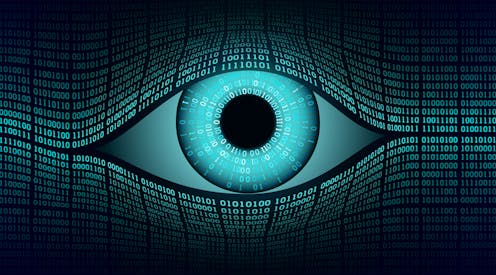a surveillance expert explains some of the ways we’re all being watched, all the time
- Written by Ausma Bernot, PhD Candidate, School of Criminology and Criminal Justice, Griffith University

A group of researchers studied[1] 15 months of human mobility movement data taken from 1.5 million people and concluded that just four points in space and time were sufficient to identify 95% of them, even when the data weren’t of excellent quality.
That was back in 2013.
Nearly ten years on, surveillance technologies permeate all aspects of our lives. They collect swathes of data from us in various forms, and often without us knowing.
I’m a surveillance researcher with a focus on technology governance. Here’s my round-up of widespread surveillance systems I think everyone should know about.
CCTV and open-access cameras
Although China has more than 50% of all surveillance cameras installed[2] in the world (about 34 cameras per 1,000 people), Australian cities are catching up[3]. In 2021, Sydney had 4.67 cameras per 1,000 people and Melbourne had 2.13.
While CCTV cameras can be used for legitimate purposes, such as promoting safety in cities and assisting police with criminal investigations, their use also poses serious concerns.
In 2021, New South Wales police were suspected of[4] having used CCTV footage paired with facial recognition to find people attending anti-lockdown protests. When questioned, they didn’t confirm or deny if they had (or if they would in the future).
In August 2022, the United Nations confirmed CCTV is being used to[5] carry out “serious human rights violations” against Uyghur and other predominantly Muslim ethnic minorities in the Xinjiang region of Northwest China.
The CCTV cameras in China don’t just record real-time footage. Many are equipped with facial recognition to keep tabs on[6] the movements of minorities. And some have reportedly been trialled to detect emotions[7].
The US also has a long history of using CCTV cameras to support racist policing practices. In 2021, Amnesty International reported[8] areas with a higher proportion of non-white residents had more CCTV cameras.
Read more: After Roe v Wade, here's how women could adopt 'spycraft' to avoid tracking and prosecution[9]
Another issue with CCTV is security. Many of these cameras are open-access, which means they don’t have password protection and can often be easily accessed online. So I could spend all day watching a livestream of someone’s porch, as long as there was an open camera nearby.
Surveillance artist Dries Depoorter’s recent project The Follower[10] aptly showcases the vulnerabilities of open cameras. By coupling open camera footage with AI and Instagram photos, Depoorter was able to match people’s photos with the footage of where and when they were taken.
There was pushback, with one of the identified people saying[11]:
It’s a crime to use the image of a person without permission.
Whether or not it is illegal will depend on the specific circumstances and where you live. Either way, the issue here is that Depoorter was able to do this in the first place.
IoT devices
An IoT (“Internet of Things”) device is any device that connects to a wireless network to function – so think smart home devices such as Amazon Echo or Google Dot, a baby monitor, or even smart traffic lights.
It’s estimated global spending on IoT devices will have reached[12] US$1.2 trillion by some point this year. Around 18 billion connected devices form the IoT network. Like unsecured CCTV cameras, IoT devices are easy to hack into if they use default passwords or passwords that have been leaked[13].
In some examples, hackers have hijacked baby monitor cameras to stalk[14] breastfeeding mums, threaten[15] parents that their baby was being kidnapped, and say creepy things like “I love you[16]” to children.
Beyond hacking, businesses can also use data collected through IoT devices to further target customers with products and services.
Privacy experts raised the alarm in September over Amazon’s merger agreement with robot vacuum company iRobot. A letter[17] to the US Federal Trade Commission signed by 26 civil rights and privacy advocacy groups said:
Linking iRobot devices to the already intrusive Amazon home system incentivizes more data collection from more connected home devices, potentially including private details about our habits and our health that would endanger human rights and safety.
IoT-collected data can also change hands with third parties through data partnerships (which are very common), and this too without customers’ explicit consent.

















